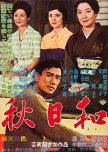Another variation on a theme by Ozu
Late Autumn (1960) is Ozu's 3rd to last film. It is recommended not to start one's Ozu exploration with this film. Wait to have seen at least four or more Ozu films. Late Autumn is a strong film, but essentially a variation on past films. Yet, it is quite enjoyable and not boring even if this is your 20th+ Ozu film. In fact, this film is more appreciable for those that have worked their way through Ozu's films, especially the post-war ones in which Setsuko Hara is introduced. It is after viewing those prior films that we are well acquainted with Setsuko's roles in the Ozuverse.
There is something about Setsuko's roles that holds a 'constancy' to a certain human temperament. Setsuko's roles are often melancholic and pure, even if they are understated. Perhaps Setsuko's roles better convey 'mono no aware' than any other Ozu characters. Her characters are wholesome, wonderful, but it is transient; while we may catch glimpses of this human character in ourselves or throughout our lives, it is a rare quality, easily squashed in our brutish world, which distorts that temperament in people that can be pure, graceful, and delicate.
Late Autumn excels in utilizing its versatile cast without any character(s) dominating the plot or screen. All are enjoyable. The trio of old men are comical together; their old-fashion and subtle mischievousness contrasts with Sasaki Yuriko's forward communication and modern woman temperament. It was refreshing to observe Yuriko's forwardness in an Ozu world full of politeness and subtlety. Her character role helps break the ice and push through a few social impasses. The exchange where the young Yuriko chews out the old men is terrific. The old men's interactions with their wives, children, and maids is also enjoyable; their loved ones seem to know the old men so well. The comedy here is that the old men try so hard to be clever but are quickly found out by all.
One of the most accomplished aspects of Late Autumn, compared to other Ozu films, is the music. In this viewing, I found little to be lacking in the music. Late Autumn's music is sophisticated, precise, and synced to the action, and does a remarkable job of conveying 'soaring happiness' or 'resigned melancholy'.
Overall, Late Autumn's presentation is bright and cheerful. It belies the more melancholic themes of the film, which are disguised through frequent interjections of comedic scheming. Ozu also limits the melancholy we can access. Several times, we see Setsuko's character, Akiko, kneeling on a mat and looking away (we cannot see her face); certainly, she is sad but the decision not to show her sorrowful face is an interesting decision.
There is something about Setsuko's roles that holds a 'constancy' to a certain human temperament. Setsuko's roles are often melancholic and pure, even if they are understated. Perhaps Setsuko's roles better convey 'mono no aware' than any other Ozu characters. Her characters are wholesome, wonderful, but it is transient; while we may catch glimpses of this human character in ourselves or throughout our lives, it is a rare quality, easily squashed in our brutish world, which distorts that temperament in people that can be pure, graceful, and delicate.
Late Autumn excels in utilizing its versatile cast without any character(s) dominating the plot or screen. All are enjoyable. The trio of old men are comical together; their old-fashion and subtle mischievousness contrasts with Sasaki Yuriko's forward communication and modern woman temperament. It was refreshing to observe Yuriko's forwardness in an Ozu world full of politeness and subtlety. Her character role helps break the ice and push through a few social impasses. The exchange where the young Yuriko chews out the old men is terrific. The old men's interactions with their wives, children, and maids is also enjoyable; their loved ones seem to know the old men so well. The comedy here is that the old men try so hard to be clever but are quickly found out by all.
One of the most accomplished aspects of Late Autumn, compared to other Ozu films, is the music. In this viewing, I found little to be lacking in the music. Late Autumn's music is sophisticated, precise, and synced to the action, and does a remarkable job of conveying 'soaring happiness' or 'resigned melancholy'.
Overall, Late Autumn's presentation is bright and cheerful. It belies the more melancholic themes of the film, which are disguised through frequent interjections of comedic scheming. Ozu also limits the melancholy we can access. Several times, we see Setsuko's character, Akiko, kneeling on a mat and looking away (we cannot see her face); certainly, she is sad but the decision not to show her sorrowful face is an interesting decision.
Questa recensione ti è stata utile?







